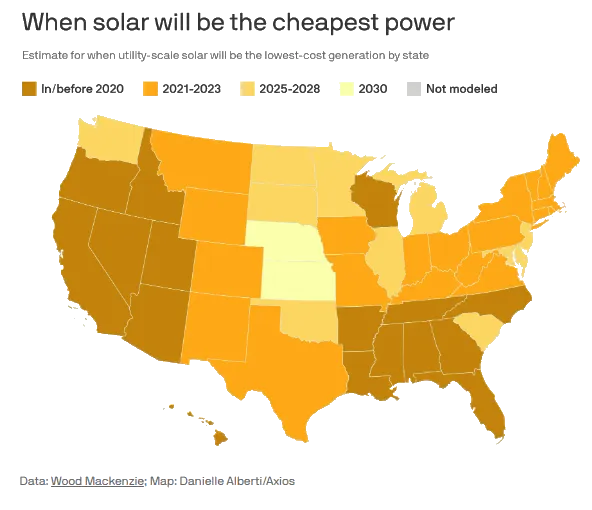
How Much Solar Costs in Your State: Installing Solar and Solar Variables Depending On Which State You're Installing Solar on Your Home
How Much Does Solar Cost in Your State?
The cost of solar varies significantly depending on where you live.
Factors such as sunlight availability, local incentives, and installation costs contribute to the overall price tag. Here's a breakdown of solar costs across different states:
Sunlight Availability: States with ample sunlight, such as California, Arizona, and Texas, tend to have lower solar costs due to higher energy production potential. Conversely, states with less sunshine may have slightly higher upfront costs but can still benefit from solar energy.
Local Incentives and Rebates: Many states offer incentives and rebates to encourage solar adoption. These incentives can include tax credits, cash rebates, and performance-based incentives, significantly reducing the cost of solar installations.
Installation Costs: Labor and installation costs vary from state to state based on local regulations, permitting requirements, and market competition. Urban areas with more solar installers may have lower installation costs compared to rural areas with limited competition.
Regulatory Environment: Some states have more favorable regulatory environments for solar, leading to lower administrative costs and streamlined permitting processes. Understanding the regulatory landscape in your state can help you estimate overall solar costs more accurately.
Utility Rate Structures: The structure of utility rates, including electricity prices and net metering policies, can influence the financial feasibility of solar. States with high electricity prices and favorable net metering policies often offer greater savings potential for solar homeowners.
Financing Options: The availability of solar financing options, such as solar loans, leases, and power purchase agreements (PPAs), can impact the upfront cost of solar for homeowners. Explore different financing models to find the most affordable option for your budget.
Future Savings Potential: While solar costs may vary by state, it's essential to consider the long-term savings potential. Investing in solar can provide significant financial benefits over the system's lifetime, including reduced electricity bills, increased property value, and protection against rising energy costs.

By understanding the factors that influence solar costs in your state, you can make informed decisions about transitioning to solar energy and maximizing your savings potential.

Campaign Disclaimer: Bright Solar Pros is a free service to assist homeowners in connecting with local service providers. All contractors/providers are independent and Bright Solar Pros does not warrant or guarantee any work performed. It is the responsibility of the homeowner to verify that the hired contractor furnishes the necessary license and insurance required for the work being performed. All persons depicted in a photo or video are actors or models and not contractors listed on brightsolarpros.com.
Copyright 2026, Bright Solar Pros, All Rights Reserved.
